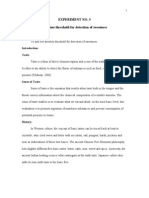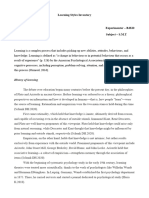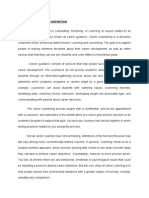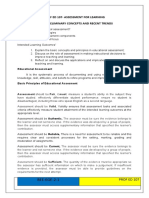Expressive Blocks
Expressive Blocks
Uploaded by
rio1847Copyright:
Available Formats
Expressive Blocks
Expressive Blocks
Uploaded by
rio1847Copyright
Available Formats
Share this document
Did you find this document useful?
Is this content inappropriate?
Copyright:
Available Formats
Expressive Blocks
Expressive Blocks
Uploaded by
rio1847Copyright:
Available Formats
Expressive blocks Expressive blocks exist when we do not have the knowledge or skills necessary to communicate or record ideas
in the ways required. They are causes by an inability to 'use 'languages' effectively, such as words, drawings, mathematics, scientific symbols, and so on. They include: I. Using the wrong language: Some problems are effectively solves or communicated using one language rather than another. For example, we are unlikely to get very far if we record data only verbally when the problem requires quantitative analysis. Similarly, people may find it hard to grasp our meaning if we try to explain our feelings about a situation using mathematics instead of words.
II.
Unfamiliarity with a particular application of a language: The most obvious example is the difficulties many people have making a speech, even though they can write their ideas effectively on paper.
III.
Inadequate explanations: These can result from a real lack of information about what you are trying to convey, or from assuming that your audience already has some of the information when, they do not.
IV.
A passive management style: A situation where we are reluctant to or find it difficult to exert influence may prevent us communicating our ideas effectively. This is particularly important when people need to be convinced of the validity of ideas.
V.
A dominant management style : This is when we exert oppressive control, either deliberately or unconsciously, and can make those we are communicating with automatically reluctant to accept what we says or hostiles to our ideas.
Environmental blocks Environmental blocks, which exist when the social or physical environment hinders our problem solving, include:
I.
Management style: The way in which we managed can influence both our attitude to problem solving and the freedom we have to .create and implement ideas. For example, if our ideas are dismissed constantly with comments such as 'No, it would not work because ...', or 'No, we've tried it before and it didn't work', we soon give up trying.
II.
Distractions: Due to excessive noise and interruptions, these affect some people more than others, but, in general they have a detrimental effect on problem solving. For example, telephone.
III.
Physical discomfort: This can create a distraction as well as resulting in stress. Or lethargy depending on the circumstances. For example, poorly designed chairs may create a distraction by giving us backaches that, in turn, can make us irritable and less interested in any type of work.
IV.
Lack of support: This comes in many forms. For example, we may need specialist information, advice, skills or other resources, or authority to take action. A more pervasive aspect of this block is a lack of encouragement and the necessary organizational structure to support and exploit people's ideas.
V.
Stress: Stress due to pressure of work and deadlines, affects people differently. For those who are susceptible to stress it can be a powerful block, hindering creative thinking in particular.
VI.
Lack of communication: This has a number of effects, including inability to get the information you require and a lack of encouragement.
Cultural blocks Cultural blocks exist when our problem solving is hindrance by accepting that some things are good or right, while others are bad or wrong. Thus, we bonded by customs. They include:
I.
Unquestioning acceptance of the status quo: There is a tendency to conform to established ideas or methods of working and not to question them or express ideas that depart from them. If something is not normal done we tend to look for the reasons why it did not or why it would not work, rather than looking for 'the reasons why it should be done or why it could work.
II.
Dislike of change: The attitude that tradition is preferable to change can arise, from the need for security. If a situation is acceptable as it is, any change, which must involve some uncertainty, felt to be threatening by some people. However, as we become accustomed to change this block is becoming less common, but there must be reasons for change. Change for change's sake can be dangerous.
III.
Fantasy and humor are not productive: There is still a widespread belief that fantasy and humor have no place in the serious business of problem solving. Subjective reports from innovators suggest otherwise. Fantasy and humor are connected by one common feature - the unlikely combination of ideas (think about it' next time you hear a good joke - the punch line is always unexpected). Innovative solutions to problems arise in the same way - by making a link between apparently unrelated ideas.
IV.
Feelings, intuition and subjective judgments are unreliable: There is a strong bias towards reason, logic and quantitative judgments because measures and communicated in inaccurate terms. Feelings, intuition and subjective judgments, which cannot be measured or communicated as effectively, are seen as unreliable and are mistrusted. Even in mathematics, one of the most logical of sciences, intuition often reported as playing a key role in, problem solving. A good problem solver needs to be able to use both objective, logical methods and subjective, intuitive methods in the search for solutions.
V.
Over-emphasis on competition or cooperation: A strongly competitive environment (for recognition, promotion, and so on) can make people unwilling to listen to the ideas of those with whom they are competing. Similarly, in a strongly cooperative environment we may avoid expressing new ideas because we don't want to stand out from the crowd.
You might also like
- Learning - Remembering and ForgettingDocument37 pagesLearning - Remembering and ForgettingRheymah Abriz80% (5)
- Translation in Language Teaching and Assessment - Facebook Com LibraryofHILDocument270 pagesTranslation in Language Teaching and Assessment - Facebook Com LibraryofHILBaudelio Muro100% (1)
- Strategic Management (Strategic MNGT Model)Document26 pagesStrategic Management (Strategic MNGT Model)Tracy Van TangonanNo ratings yet
- Quint's Lost Dutchman's Gold MineDocument7 pagesQuint's Lost Dutchman's Gold Minerajat_agrawalNo ratings yet
- Barriers To Problem SolvingDocument14 pagesBarriers To Problem SolvingMARRYCHRES MEDINANo ratings yet
- Understanding Attention: Cognitive PsychologyDocument28 pagesUnderstanding Attention: Cognitive Psychologyjai HindNo ratings yet
- Concepts of PsychophysicsDocument4 pagesConcepts of PsychophysicsAamnahMustafaNo ratings yet
- Attribution and Impression FormationDocument19 pagesAttribution and Impression FormationNoori Zahoor Khan100% (1)
- Case Study Mental RetardationDocument8 pagesCase Study Mental RetardationElirene IrenNo ratings yet
- Cognitive Psyc Notes PGDocument20 pagesCognitive Psyc Notes PGLata arya100% (1)
- Adjustment Mechanism HED419 22Document6 pagesAdjustment Mechanism HED419 22josephmagic84No ratings yet
- Taste PracticleDocument9 pagesTaste Practicleramizarasheed100% (1)
- Learning Styles InventoryDocument14 pagesLearning Styles Inventorybhavyadusad06No ratings yet
- Creativity & Investment and Confluence TheoryDocument5 pagesCreativity & Investment and Confluence TheorySpk Sudhin100% (1)
- Ignou M Ed Mes 052 Study Material1Document32 pagesIgnou M Ed Mes 052 Study Material1sivapathasekaranNo ratings yet
- Importance of Cognitive PsychologyDocument2 pagesImportance of Cognitive PsychologyHazel Vakharia100% (1)
- Attention in PsychologyDocument10 pagesAttention in PsychologyJohn henryNo ratings yet
- Nature & Theories of PersonalityDocument14 pagesNature & Theories of PersonalityEkta Saxena100% (1)
- Chapter 9 Voluntarism Structuralism and Other Early APDocument46 pagesChapter 9 Voluntarism Structuralism and Other Early APSyeda Farva50% (2)
- Psychological Aspects of DisabilityDocument26 pagesPsychological Aspects of DisabilitySuman SharmaNo ratings yet
- Serial Verbal LearningDocument16 pagesSerial Verbal Learningbhavyadusad06No ratings yet
- Meaning and Definitions of Group Dynamics - ImportanceDocument3 pagesMeaning and Definitions of Group Dynamics - ImportanceanjicieflNo ratings yet
- Unit 4 Memory and ForgettingDocument18 pagesUnit 4 Memory and ForgettingTofik MohammedNo ratings yet
- Davis, R. A., Flett, G. L., & Besser, A. (2002)Document15 pagesDavis, R. A., Flett, G. L., & Besser, A. (2002)Christian FerreiraNo ratings yet
- Unit 7 Special - Tests 7th UnitDocument71 pagesUnit 7 Special - Tests 7th UnitKaran SinghNo ratings yet
- Principles of Scientific Management by TaylorDocument2 pagesPrinciples of Scientific Management by Taylorrachana darigiNo ratings yet
- A Study On Level of Verbal Intelligence Among Students of Government Upper Primary SchoolDocument5 pagesA Study On Level of Verbal Intelligence Among Students of Government Upper Primary SchoolDeepaliNo ratings yet
- Attitude MeasurementDocument13 pagesAttitude MeasurementCharles Ondieki0% (1)
- Types of Counselling and Counselling Skills 2Document12 pagesTypes of Counselling and Counselling Skills 2Lorna Dollisen Labrada - MiguelaNo ratings yet
- Cognitive Perspective by Albert EllisDocument5 pagesCognitive Perspective by Albert EllisshaistaanumpsychologistNo ratings yet
- MaladjustmentDocument28 pagesMaladjustmentchinchuNo ratings yet
- Cognitive Style Inventory (Csi) Date: 18/09/2020 Test: 1Document6 pagesCognitive Style Inventory (Csi) Date: 18/09/2020 Test: 1aysha farihaNo ratings yet
- Paper 6 - Unit 1 Guidance and CounsellingDocument7 pagesPaper 6 - Unit 1 Guidance and CounsellingTanvi ManjrekarNo ratings yet
- Industrial Morale 1Document13 pagesIndustrial Morale 1Priya Sinha100% (1)
- Positive Psychotherapy NotesDocument34 pagesPositive Psychotherapy NotesShruti Agrawal100% (1)
- Effects of Social Media Effects of Social MediaDocument3 pagesEffects of Social Media Effects of Social MediaWaleed KhanNo ratings yet
- Top 6 Methods of Educational PsychologyDocument13 pagesTop 6 Methods of Educational PsychologyINo ratings yet
- Introduction To Experimental PsychologyDocument28 pagesIntroduction To Experimental PsychologyRishika Prakash100% (1)
- NOTES Groups HepworthDocument4 pagesNOTES Groups Hepworthejanis39No ratings yet
- Introduction To Psychological TestingDocument5 pagesIntroduction To Psychological TestingKhushi GandhiNo ratings yet
- 4 - Reactance TheoryDocument33 pages4 - Reactance TheoryOnur GökNo ratings yet
- Spba103 Legal System in BusinessDocument174 pagesSpba103 Legal System in Businesshari prasathNo ratings yet
- Basic Communication Skills in CounselingDocument2 pagesBasic Communication Skills in CounselingMarianne Dalmacio100% (1)
- Multiple Choice Questions - Online ResourcesDocument5 pagesMultiple Choice Questions - Online ResourcesARPITA DUTTANo ratings yet
- 5 Drivers QuestionnaireDocument2 pages5 Drivers QuestionnairehamzaaidropNo ratings yet
- Ginzberg's Career Development Theory: BatrisyiadibahawathirahDocument6 pagesGinzberg's Career Development Theory: BatrisyiadibahawathirahHawa ZainoddinNo ratings yet
- Social Psychology Lecture No. 01: Class: (MLT, OTT, RIT, ENG - 1 Semester)Document8 pagesSocial Psychology Lecture No. 01: Class: (MLT, OTT, RIT, ENG - 1 Semester)syed hamzaNo ratings yet
- Chapter 1.3 PDFDocument19 pagesChapter 1.3 PDFmahesh_khebadeNo ratings yet
- Psychology e Book NewDocument134 pagesPsychology e Book NewDivyaNo ratings yet
- Career Counselling DefinitionDocument5 pagesCareer Counselling DefinitionNurunNisa'aAbdulWahabNo ratings yet
- Social Influence:: Changing Others ' BehaviorDocument25 pagesSocial Influence:: Changing Others ' BehaviorAllen LauroraNo ratings yet
- The 4 Stages of Cognitive DevelopmentDocument10 pagesThe 4 Stages of Cognitive DevelopmentDevera GinalynNo ratings yet
- Issues and Challenges During Adolescence - Dr. Ismail ThamarasseriDocument38 pagesIssues and Challenges During Adolescence - Dr. Ismail ThamarasserimahdiNo ratings yet
- Individual and Family WellnessDocument5 pagesIndividual and Family WellnessHesti SulistyawatiNo ratings yet
- What Is Psychoanalytic Therapy: Dream Interpretation: According To Freud, Dream Analysis Is by Far TheDocument2 pagesWhat Is Psychoanalytic Therapy: Dream Interpretation: According To Freud, Dream Analysis Is by Far Thebuhari rabiuNo ratings yet
- Stress and Coping NotesDocument10 pagesStress and Coping NotesMinal Jain100% (1)
- Shivamogga District Disaster Management Plan 2019-2020Document238 pagesShivamogga District Disaster Management Plan 2019-2020Monika AcharyaNo ratings yet
- Attitude and Social CognitionDocument8 pagesAttitude and Social Cognitionlipsy bhattNo ratings yet
- Psychology - Problem SolvingDocument6 pagesPsychology - Problem SolvingJl LopezNo ratings yet
- Hope AssignmentDocument7 pagesHope AssignmentFz AhmadNo ratings yet
- Ignou M Ed Mes 053 Study MaterialDocument34 pagesIgnou M Ed Mes 053 Study MaterialsivapathasekaranNo ratings yet
- Governance and the Three Arms of Government in Sierra LeoneFrom EverandGovernance and the Three Arms of Government in Sierra LeoneNo ratings yet
- Communicating and Managing Communication (7 Readings)Document20 pagesCommunicating and Managing Communication (7 Readings)Ahmed DahiNo ratings yet
- Edie - Husserl vs. DerridaDocument17 pagesEdie - Husserl vs. DerridaTheoriaNo ratings yet
- Meet Director of Research Education Michelle Picard From The School of EducationDocument2 pagesMeet Director of Research Education Michelle Picard From The School of EducationFaculty of the ProfessionsNo ratings yet
- Edgemont k-2 Parent Presentation PDFDocument113 pagesEdgemont k-2 Parent Presentation PDFYass CosmeticsNo ratings yet
- Darma 2019 J. Phys. Conf. Ser. 1233 012042-1 PDFDocument8 pagesDarma 2019 J. Phys. Conf. Ser. 1233 012042-1 PDFMuhammad Yasnan A1K117082No ratings yet
- Machine Translation TechnologiesDocument30 pagesMachine Translation TechnologiesАленаNo ratings yet
- Cambridge International AS & A Level: PSYCHOLOGY 9990/04Document10 pagesCambridge International AS & A Level: PSYCHOLOGY 9990/04shehzil000No ratings yet
- Group 1 Small Group Counseling Curriculum Grief Loss Lesson PlanDocument27 pagesGroup 1 Small Group Counseling Curriculum Grief Loss Lesson Planapi-549169454No ratings yet
- Science Lab Report GuideDocument33 pagesScience Lab Report GuideAnita KapadiaNo ratings yet
- Lesson Plan For Health Education EducationDocument5 pagesLesson Plan For Health Education EducationCynthi Joyce JohnNo ratings yet
- Health 10 Quarter 1 - Week 8 Programs For Consumer Welfare and ProtectionDocument3 pagesHealth 10 Quarter 1 - Week 8 Programs For Consumer Welfare and ProtectionKevin Bulanon0% (1)
- 02 ELMS Review (Prelim) Part 2 (Prelims)Document2 pages02 ELMS Review (Prelim) Part 2 (Prelims)isaerah marie aransazoNo ratings yet
- RubricsDocument2 pagesRubricsJessica Gotera RegaspiNo ratings yet
- The Students/pupils in The Long Run and On Their Own Will Be Able ToDocument4 pagesThe Students/pupils in The Long Run and On Their Own Will Be Able ToDayhen Afable BianesNo ratings yet
- HeroesDocument7 pagesHeroesapi-406754534No ratings yet
- 3 IllustrExDocument16 pages3 IllustrExAlen SuljicNo ratings yet
- Chas Freeman - Diplomacy As A ProfesionDocument7 pagesChas Freeman - Diplomacy As A ProfesionNadu Porcel RoldanNo ratings yet
- A 0 Activity 0 CE 146 School or Administrative PoliciesDocument17 pagesA 0 Activity 0 CE 146 School or Administrative PolicieslantacaegieNo ratings yet
- GIYF-FFS Compound, San Mariano, Roxas, Oriental Mindoro 5212 Contact Number: 0917-894-1581Document3 pagesGIYF-FFS Compound, San Mariano, Roxas, Oriental Mindoro 5212 Contact Number: 0917-894-1581Tyron Marc ColisNo ratings yet
- Editorial Writing OutlineDocument2 pagesEditorial Writing OutlineXYRA KRISTI TORREVILLASNo ratings yet
- Plan de Lectie A 7 EaDocument9 pagesPlan de Lectie A 7 EaAdelina SandaNo ratings yet
- Midterm in Class Reflective Essay JenayamcgeeDocument3 pagesMidterm in Class Reflective Essay Jenayamcgeeapi-282139870No ratings yet
- Daily Lesson LOG: Sablayan National Comprehensive High School (Senior High School) Grade Level Grade 12Document3 pagesDaily Lesson LOG: Sablayan National Comprehensive High School (Senior High School) Grade Level Grade 12Ronnel DugangNo ratings yet
- Sport & Exercise PsychologyDocument25 pagesSport & Exercise PsychologyVukashin.meNo ratings yet
- Prof Ed 107-Assessment For Learning Unit 1 Preliminary Concepts and Recent TrendsDocument3 pagesProf Ed 107-Assessment For Learning Unit 1 Preliminary Concepts and Recent TrendsDevine Gabat100% (1)
- Portfolio Checklist and Self AssessmentDocument1 pagePortfolio Checklist and Self AssessmentalegadokenjiNo ratings yet
- Konsep Mutu Dan Total Quality Manajement (TQM) Dalam Dunia Pendidikan Serta Upaya Peningkatan Mutu PendidikanDocument18 pagesKonsep Mutu Dan Total Quality Manajement (TQM) Dalam Dunia Pendidikan Serta Upaya Peningkatan Mutu PendidikanIvan AprilioNo ratings yet
- Optimalisasi Penyampaian Materi Pembelajaran Seni Budaya Dan Prakarya Melalui Pembelajaran Terpadu Berbasis GpoDocument10 pagesOptimalisasi Penyampaian Materi Pembelajaran Seni Budaya Dan Prakarya Melalui Pembelajaran Terpadu Berbasis GpoSafiraNo ratings yet

























































































